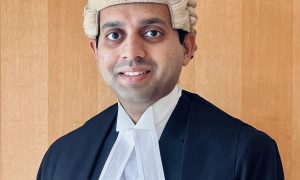This interview has been published by Priyanka Karwa and The SuperLawyer Team

Can you tell us about your journey in the legal services industry and how you ended up specializing in Tech, Internet, Software, and Contract Law?
My legal journey started in a boutique law firm, which specialised in a variety of areas of law, including civil, criminal, commercial, property and corporate law. I would spend my time as an intern focusing on obtaining the maximum exposure I could in these afore-mentioned areas of the law, to provide me with not only general legal knowledge but to afford me with the ability to ascertain the branch of law I would later specialise in. Many long hours were spent in front of the photocopy machine during this stage. I soon graduated as an intern to overseeing the commercial and civil departments of this boutique law firm.
Shortly afterwards, I was afforded the opportunity to move on to mainly in-house counsel roles where I was responsible for heading up the legal department and attending to all corporate matters for a start-up business institute company in South Africa.
Thereafter, I moved to join the commercial department of an international company based in the U.K., as a Senior Associate. This company specialized in outsourcing legal services to both top-tier law firms and tech savvy businesses around the world. My passion for technology, internet, software and contract law was born during this stage of my legal experiences, where I was working with front runners of the tech industry and their legal needs on a daily basis.
Subsequently I was headhunted by a European-based company, with worldwide offices, to join their team as their Head of Legal. This position afforded me with the opportunity to work and grow with a start-up company, where I was responsible not only for the legal aspects a company faces from day-to-day but also the operations, marketing and business performance of the company. This gave me a full house experience of all the operational aspects within a company. However, I soon craved to get back to technology and contract law. It was then that I decided to venture forward to become a freelance legal counsel working with companies across sectors, whilst focusing in the area of business and legal consulting on technological related transactions, outsourcing agreements and covering the full spectrum of commercial and business law related issues.
As a U.K. qualified Barrister and Multi-Jurisdictional Lawyer, you have worked with clients across local and international borders. How has this diverse experience shaped your perspective on legal issues and cross-border transactions?
I have found that as businesses continue to grow and open offices in multiple locations, to meet the demands of the evolving global marketplace, clients are keen to obtain trusted legal counsel who are able to understand their business needs and provide specialist advice not only on the local laws of the countries in which the client is based, but also in other jurisdictions. This allows the companies to grow holistically, in that legal counsel is able to support and negotiate on behalf of the company with parties in multiple countries that typically have varying, and sometimes conflicting, legal and regulatory environments. Cross border transactions are often complex and challenging, as you are faced with cultural differences that may impact business negotiations, language barriers, and conflicting laws which can sometimes impede the legal process. However, what is key is to always come from a place of patience, respectfulness, and have open communication.
You have extensive experience in reviewing and drafting various types of contracts in the tech industry, including Software Licensing, SaaS, PaaS, IoT, and AI-related contracts. Could you share some insights into the unique challenges and considerations when dealing with these types of agreements?
The main challenges of drafting and reviewing tech/software/internet related contracts is to ensure that you have understood the client’s business and have obtained the maximum information from the client. As I draft bespoke contracts for my clients, I find it imperative that I understand my client’s business model, needs and concerns before putting pen to paper. This sometimes involves numerous rounds of Q&A. But sticking to the process, no matter how tedious it can sometimes be, ensures that I am able to minimize my client’s potential risks and provide suitable advice and recommendations.
Contracts are the focus point for many business transactions as they document the relationship, services, products and rights of each of the parties involved. As such, a well drafted contract should always aim to be unambiguous and clear so that it may be understood by a layperson, as well as not being open to judicial interpretation which may not be favourable to the client. Poorly drafted contracts pave the way for possible disputes between the parties when the interpretation of the terms of the contract and intention of the parties are questioned. Contracts should be seen as an asset for the client, protecting the client and other party’s rights, while making them feel safe and understood, so that the client is able to concentrate on important business matters.
Internet Law is another area of expertise for you, encompassing website terms and conditions, privacy policies, and contracts related to web-based and mobile applications. How do you navigate the evolving landscape of internet regulations and ensure compliance for your clients?
The best way to stay abreast of ever-changing regulations is to read continuously. I find that subscribing to legal journals and newsletters, which drop updates in to your mail box frequently are a great way of keeping up to date. Also, speaking with fellow colleagues in the same industry is always an added bonus. I am a firm believer that knowledge should be shared to allow us all to grow and evolve.
It is important to note that bar councils and other legal authorities are also available to provide guidance and practice notes to assist lawyers in remaining compliant with their legal duties towards their clients, as legal professionals.
In your role as a Head of Legal, you were responsible for setting up business operations, developing marketing strategies, and managing a team in a global organization. What were some of the key challenges you faced in this position, and how did you overcome them?
I have always loved practicing law, so whilst embarking on this journey as Head of Legal, I attempted to enjoy each step and to meet any challenges head on. I would say that the most challenging was the constant travelling and the long working hours. It was sometimes difficult to remain motivated when you are working 7 days a week for a minimum of 12 hours. I also had a young family at this time, and sharing my time with them was equally (if not more) important and required great discipline and time management on my part. It is always imperative, as lawyers and legal professionals that we keep in mind what matters in this world, so that you are able to strive for personal development in your career whilst also making memories with those that are close to you. Striking this balance is not always easy, but the rewards are innumerable!
During your tenure as a Director of Legal Affairs, you focused on corporate administration, contract review, and training programs. Could you elaborate on your experience in developing comprehensive training programs on legal and business-related principles?
While I was working with this company as the Director of Legal Affairs, the company developed a new branch of their business which aimed at educating both high school graduates and well-seasoned business people on various aspects of business administration and management in the hospitality industry. It was at this time that I was approached, by the company and a recognized university, to work together to develop and offer a training module for their Management Development Programme, focusing on the laws that a business owner would need to successfully run a company. This was a 12 week intensive program, accompanied by assessments to gauge the students understanding of the information being taught. It was a highly rewarding experience which gave me new found respect for teaching professionals, as well as great pride in playing a small part in sharing knowledge with others.
I subsequently also upskilled myself and became a registered facilitator and moderator for certificate-level training courses.
You have published several articles on topics such as outsourcing technology services, virtual merger agreements, and executing legal agreements through innovative methods like WhatsApp. What drives you to share your knowledge through these publications, and how do you stay updated on the latest trends and developments in the legal field?
I believe that knowledge is not something we should keep hidden. Knowledge shared means that we all grow, and as a result we better ourselves but also our environment. Engaging in educational pedagogy sharing is great for building rapport and relationships, makes us become stronger as professionals, and within the workplace, it supports growth and innovation amongst all team members.
As provided earlier, I stay abreast of the latest trends and developments in the legal field, not only through subscribing to relevant journals/newsletters, but also communicating with my peers, discussing legal cases with them, and developing a thirst to become the best version of myself so that I am able to provide my clients with a high-quality service.
With your wealth of experience, what advice would you give to fresh law graduates who are considering a career in the legal services industry? What skills and qualities should they focus on developing to succeed in today’s legal landscape?
To those of you, who have just completed your law studies, I would say that you should concentrate on establishing your passion, put your head down and work hard, absorb as much knowledge (both printed and practical) as you possibly can, remain humble and true to yourself, and always aim to provide an exemplary service to your clients.
To succeed I would say the qualities you should focus on is to remain authentic, be positive, work hard and be determined and diligent. In terms of skills, the sky is the limit. Choose what you have a passion for, and immerse yourself so that you become an expert whilst always increasing your knowledge either through taking courses, speaking with fellow peers, or reading.
Throughout your career, you have worked with start-ups, established companies, and individuals. What have been some of the most rewarding aspects of providing legal counsel to these different types of clients?
The best reward is ALWAYS a happy client. There is no amount of words for the feeling of being able to satisfy your client’s business needs and having your client shower you with praises. Also, having clients from various sectors, and at different stages of their business or personal journey is a learning curve. Each lesson learnt makes for a stronger lawyer when the next client comes along. Each type of client brings their own set of challenges, which as legal professionals we must overcome. The best advice I can give is to take things slow and move one step at a time. Do not rush in too fast. The time taken at the initial meeting with the client is a significant step in ensuring the success of the job and a happy client.
As the legal landscape continues to evolve, what emerging trends or challenges do you foresee in the areas of Tech, Internet, Software, and Contract Law? How do you anticipate these changes will impact legal professionals and their clients?
The areas of technology, internet, software and contract law are ever evolving areas especially as we live in a technologically advanced era where change is inevitable. I foresee that these areas will continue to grow and expand, especially as more businesses venture for a global presence. This growth and development will no doubt challenge current legislation which is more suited for traditional businesses. Thus, the legal industry will be forced to adapt so that current legislation meets these changes.
To stay ahead of the game, legal professionals must keep themselves informed on legal and regulatory changes, but also familiarize themselves with the intricacies of their client’s business models, services/product offering, technology, and not taking a backseat, but becoming immersed and a champion of the client’s business is mandatory. Most important of all is setting the bar high and providing a QUALITY professional service at all times!
Get in touch with
























